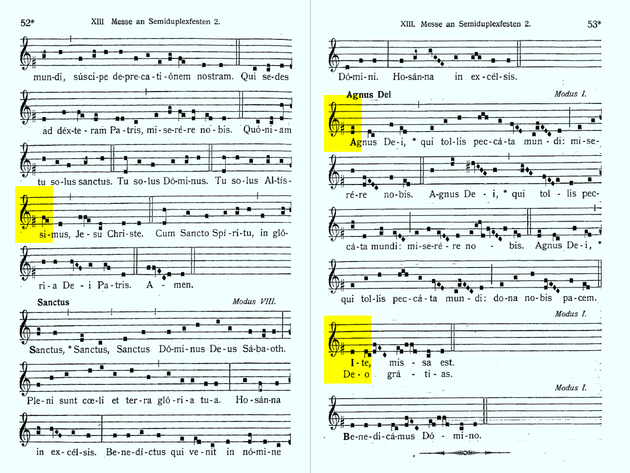 VEN TODAY, masters of the Gregorian Repertoire can be found. One example is Dr. Horst Buchholz, who currently serves as choirmaster at the Cathedral Basilica of Saint Louis, Missouri. He has many talents. For example, Dr. Buchholz can look at Gregorian notation and immediately create beautiful organ accompaniments—and I’ve seen him do it. Most organists agree that if one chooses to accompany plainsong, Dr. Buchholz’s approach is the best. Were I to attempt such a thing, I would probably “cheat” by using this marvelous edition by Dr. Karl Weinmann, printed on modern staves:
VEN TODAY, masters of the Gregorian Repertoire can be found. One example is Dr. Horst Buchholz, who currently serves as choirmaster at the Cathedral Basilica of Saint Louis, Missouri. He has many talents. For example, Dr. Buchholz can look at Gregorian notation and immediately create beautiful organ accompaniments—and I’ve seen him do it. Most organists agree that if one chooses to accompany plainsong, Dr. Buchholz’s approach is the best. Were I to attempt such a thing, I would probably “cheat” by using this marvelous edition by Dr. Karl Weinmann, printed on modern staves:
* * PDF Download • GREGORIAN KYRIALE on Modern Staves (94 pages)
It was first printed in 1909. A century later, we scanned the book and placed it online. You can read the Preface in English thanks to Dr. Janya Martin.

In a certain sense, I feel Dr. Weinmann really did create a powerful tool in 1909. On the other hand, it might be dangerous—because it will prevent singers from learning how to read Gregorian notation properly. By the way, this book never caught on because of a certain “situation” that developed involving a quarrel between the Solesmes monastery and the Sacred Congregation of Rites—but that’s another story for another day! The final result: Rome officially stopped any publisher from printing “modified” versions of the Editio Vaticana, and Weinmann’s edition certainly does modify the neumes by making the Porrectus (“flexus resupinus”) easier to read.
One thing cannot be doubted: This “inexpensive choral edition” (as the Preface refers to it) must have required a tremendous effort to produce, especially in such a beautiful and professional way.
If you visit the St. Jean de Lalande Library of Rare Books, you can download the complete Graduale by Weinmann: all 678 pages!
